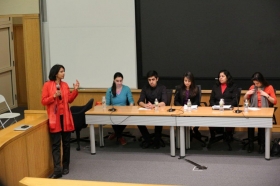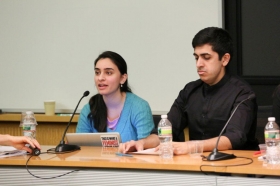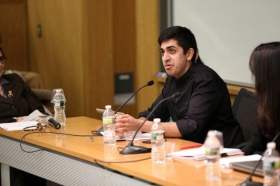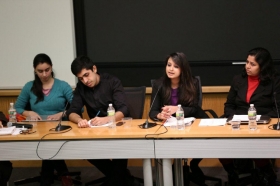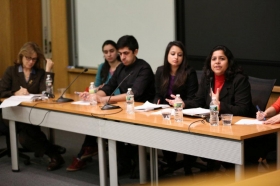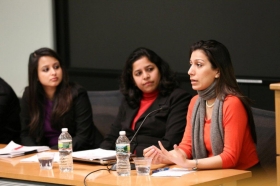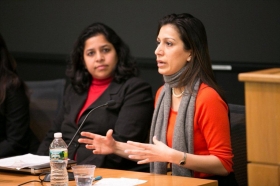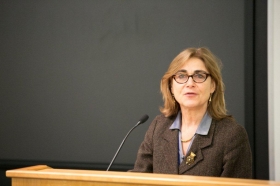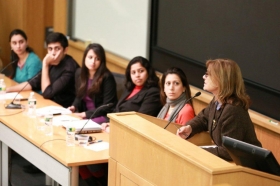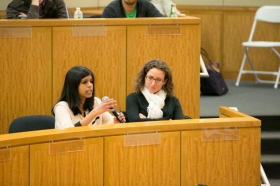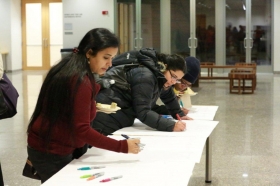When a 23-year old woman, accompanied by a friend with whom she had just watched the movie Life of Pi, was brutally raped and fatally assaulted by a group of five men in Delhi this past December, the resulting media frenzy and outpouring of emotion at an international level was unprecedented. The galvanization across sectors of Indian society in the aftermath of this high-profile incident, while promising in some ways, raises issues of potentially treacherous complexity.
In an effort to analyze the context of this case, explore pathways for change, and contemplate on strategies for making the most of the current window of opportunity, an interdisciplinary and pan-South Asian panel of Harvard students convened on February 20, moderated by Jacqueline Bhabha, Jeremiah Smith, Jr. Lecturer on Law at Harvard Law School, University Advisor on Human Rights and Director of Research at the FXB Center and Carr Center. The two-hour discussion painted a multi-faceted, nuanced perspective on the issue of sexual assault and gender-related violence in the South Asia region, addressing notions of national and social identity, sexual norms and ethics, and the role of the media and education sectors.
Nur Ibrahim, a college senior from Lahore, highlighted the history of mass sexual violence by discussing the high rates of rape in the region during partition, 1971 and amidst the 2002 Gujarat riots. This history, she argued, shows how battles for political and cultural supremacy between different groups flow into a war on women’s bodies themselves. While this history might seem removed from the Delhi incident, Ibrahim suggested that the fact that much of this past violence has been overlooked in the public sphere is not disconnected with contemporary attitudes.
Abbas Jaffer, a doctoral student specializing in research on masculinity in South Asia, then addressed popular notions of male insecurity as a cause for sexual aggression, and invited the audience to consider the idea that “masculinity and gender violence are not isomorphic”, and that de-link masculinity and violence can and ought to be de-linked through grassroots efforts. He also highlighted the disparity in attention given to cases of violence amidst different classes and marginalized communities.
HKS students Sabrin Chowdhury and Litcy Kurisinkal both highlighted the persistence of shame and taboos around sexuality in many South Asian families. Chowdhury also suggested the importance of getting faith-based organizations more actively involved in awareness and prevention, citing their powerful role as cultural brokers, while Kurisinkal highlighted the economic inequities that play a role in the upbringing of street children and juvenile delinquents (one of the accused in the trial of the Delhi victim was 17).
Mariam Chughtai of HGSE reflected on some recent high-profile cases of violence against females in Pakistan, and shared some of her observations and lessons learned. These included a need for awareness around how victims can become exploited by even civil society for their own aims; the need to address a culture of discomfort in showing sympathy for victims of violence; that ultimately change must occur at the local level, and that the media’s fickleness necessitates committed perseverance by those who work for change.
In an especially interesting moment, moderator Bhabha acknowledged some international controversy generated in the blogosphere by the furor of some colleagues in India and elsewhere at the establishment of a Harvard committee that is being put together to craft a working paper for action around the issue of gender-based violence. While recognizing that the work for change is being carried out and has been carried out by generations of activists, men and women, on the ground in South Asia, Bhabha cautioned against a stance that would silence ideas from an institution in the United States, regardless of its distance from South Asia or the elite reputation of a place like Harvard. Besides being invited to participate in the working paper committee, audience members at the end were also encouraged to share and document their reflections and thoughts after the panel on paper provided by the South Asia Institute. – Nabil Khan Vice-President Communications, Harvard Pakistan Student Group
India Rape Trial Starts With Renewed Ban on Media Coverage, NYTimes, Jan. 24, 2013
Full text: Justice JS Verma Committee Report on Amendments to Criminal Law, IBN Live, Jan. 23, 2013
Afghan rape victim ‘attacked again by government workers protecting her’, The Guardian, Jan. 23, 2013
How do you learn grit? Video, The Economist.com, Jan. 22, 2013
Bolivian State Politician Caught on Video Allegedly Raping Unconscious Woman on Parliament Floor, Jezebel, Jan. 18, 2013
Reflections of a sorry repatriate, India Today, Jan. 18, 2013
Nigeria has a rape culture too, The Guardian, Jan. 14, 2013
Amid rape fiasco, India’s leaders keep up insensitive remarks, The Washington Post, Jan. 4, 2013
The Delhi student movement, The Express Tribune, Jan 8, 2012
Changing attitudes towards women, The Express Tribune, Dec. 31, 2012
Mukhtar Mai – the gang rape victim who defied her attackers, New Statesman, Oct. 19, 2012
Harvard College Women’s Center – A History of Violence
Some thoughts on rape, sexual violence and protest – Devika Narayan
America’s Rape Problem: We Refuse to Admit That There Is One – The Nation, Jan. 4 2013
No Shortcuts on Rape – Economic and Political Weekly, Jan. 12, 2013
Let’s ask how we contribute to rape – The Hindu, Dec. 25, 2012
Rape and the crisis of Indian masculinity – The Hindu, Dec. 19, 2012
A moment of triumph for women – The Hindu, Jan. 25, 2013
Alchemizing anger to hope – The Hindu, Jan. 25, 2013
The rapist in the mirror – The Hindu, Jan. 11, 2013

